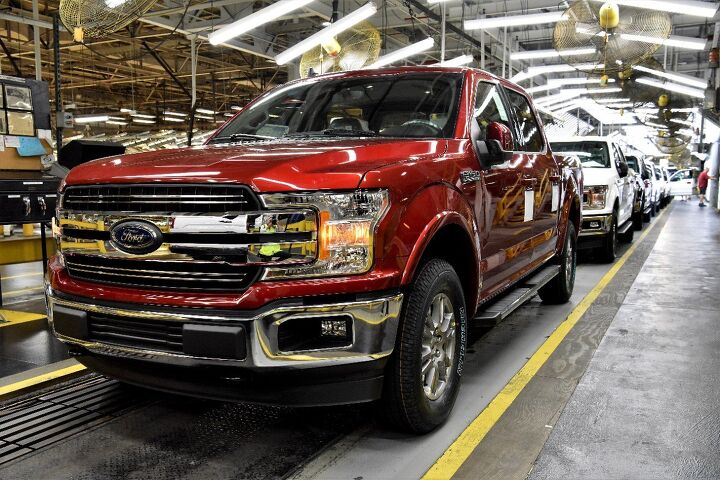Auto Industry Assets Could Be Seized by Russian Nationalization

The war in Ukraine continues to have ripple effects.
A new report from industry bible Automotive News suggests Vladimir Putin is considering seizing the assets of automakers who left Russia in the wake of its invasion of Ukraine.
Ford, Mercedes-Benz, Renault, Stellantis, and Volkswagen are among the companies that left Russia behind in the wake of the fighting. Putin is apparently proposing nationalizing these and other companies, using the euphemism “external management.” Isn’t it grand how corporations and governments can use neutral-sounding buzzwords to soften the blow of misdeeds?
This is all in response to sanctions that are causing Russia pain.
“If foreign owners close the company unreasonably, then in such cases the government proposes to introduce external administration,” Russian Prime Minister Mikhail Mishustin reportedly said this month, according to CNN. “Depending on the decision of the owner, it will determine the future fate of the enterprise.”
At least one analyst thinks there’s a risk Putin and company will make good on their threats.
“I think it’s a high risk,” Joe McCabe, CEO of AutoForecast Solutions, told Automotive News. “Putin’s not shy about walking away from an industry that supports employment in his country, that builds product for local consumers. There are high odds that companies that have left, or ones that are leaving, are nationalized for the sake of his country’s economy.”
There’s a lot of money at stake — Mercedes-Benz, for example, has about $2.2 billion dollars of assets at risk of seizure, including a plant that opened near Moscow in 2019.
Analysts point out that even if Russia seizes plants, it won’t be a simple matter to restart assembly lines. That’s because Russia is cut off from global trade and wouldn’t be able to source components.
Unless, of course, it got help from a friendly nation like China. But analysts also point out the Chinese might not help the Russians, since aiding a country with inferior technology that’s waging an unpopular war might not be in China’s best interest.
The report says automakers always knew nationalization was a possibility, which is why they’ve limited their production investments in Russia. Automakers also won’t be likely to feel too much of a financial pinch.
That said, a couple of OEMs might take it on the chin more than others. Russia accounts for 2.1 percent of global car sales, but it’s 5.7 percent for Hyundai and 7.8 for the Renault/Mitsubishi/Nissan alliance. There’s also this: Analysts say that even if the plants do restart production, it will be at a lower volume than normal because of — say it with me — Russia’s economic troubles.
[Image: Ford. Note: The plant shown is in Kansas, not Russia, and the photo is for illustrative purposes.]

Tim Healey grew up around the auto-parts business and has always had a love for cars — his parents joke his first word was “‘Vette”. Despite this, he wanted to pursue a career in sports writing but he ended up falling semi-accidentally into the automotive-journalism industry, first at Consumer Guide Automotive and later at Web2Carz.com. He also worked as an industry analyst at Mintel Group and freelanced for About.com, CarFax, Vehix.com, High Gear Media, Torque News, FutureCar.com, Cars.com, among others, and of course Vertical Scope sites such as AutoGuide.com, Off-Road.com, and HybridCars.com. He’s an urbanite and as such, doesn’t need a daily driver, but if he had one, it would be compact, sporty, and have a manual transmission.
More by Tim Healey
Latest Car Reviews
Read moreLatest Product Reviews
Read moreRecent Comments
- VoGhost Interesting comments. Back in reality, AV is already here, and the experience to date has been that AV is far safer than most drivers. But I guess your "news" didn't tell you that, for some reason.
- Doc423 Come try to take it, Pal. Environmental Whacko.
- 28-Cars-Later Mazda despite attractive styling has resale issues - 'Yota is always the answer.
- 28-Cars-Later Try again.
- Doc423 It's a flat turn, not banked, which makes it more difficult to negotiate, especially if you're travelling a little too fast.


































Comments
Join the conversation
Top Gear (the real one) Season 12, Episode 6. https://www.motortrendondemand.com/detail/the-ultimate-ford-fiesta-review-featuring-the-royal-marines/9978/556 (Skip ahead to the 20 minute mark if you must)
If you have read down this far and are who I think you are, you might be interested in this: https://youtu.be/KJkmcNjh_bg https://youtu.be/Lem3enNkbV0 (There's more but you will find it on your own [if you can avoid distractions, as you have already demonstrated])